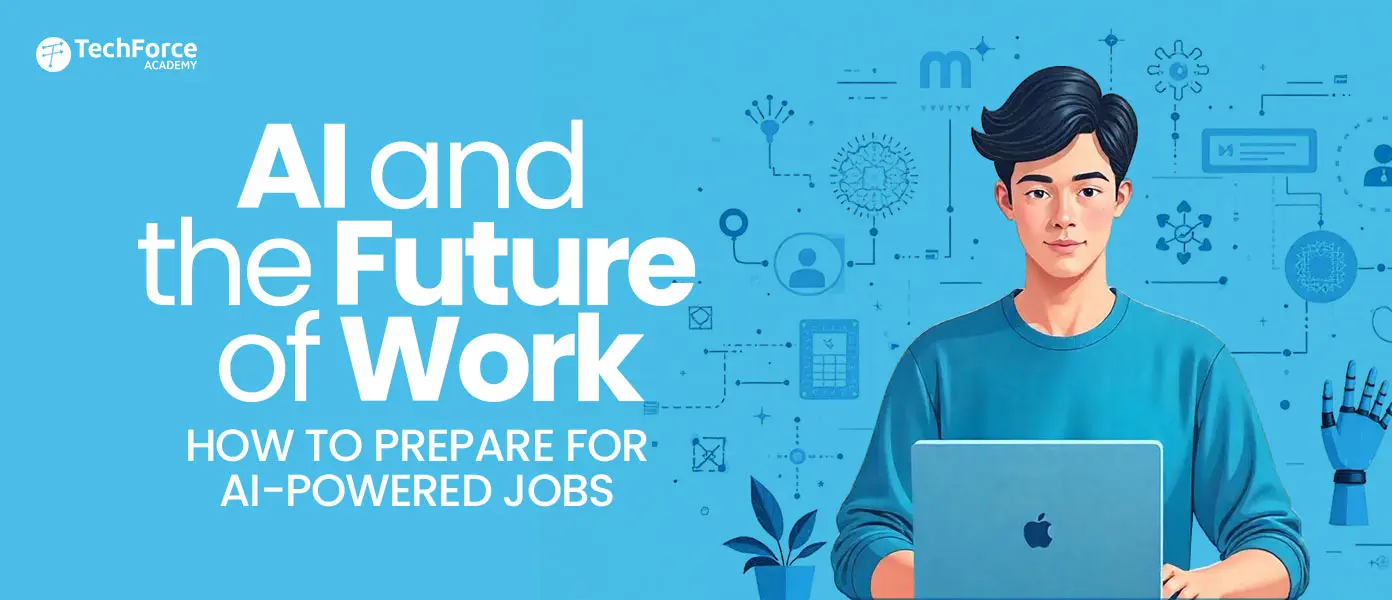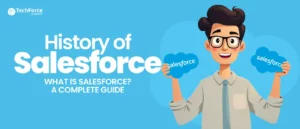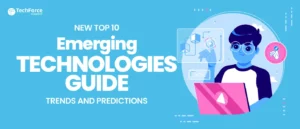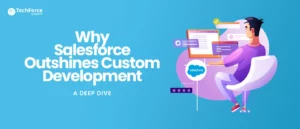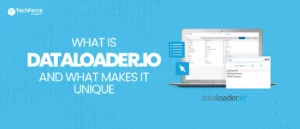Artificial intelligence is influencing the future of work. It is changing the way we work. It means jobs will increasingly be powered by AI, requiring individuals to adapt and develop new skills to remain competitive in the workforce.
While some jobs may be automated and replaced, AI will also create new opportunities for roles that require human creativity, critical thinking, and collaboration alongside AI systems.
Did you know that 85 million jobs may be displaced by AI by 2025, but 97 million new AI-driven jobs will emerge? (Source: World Economic Forum report).
Not ready for this change? No worries, let’s check out this blog and figure out how to get ready for AI-powered future trends and skills!
Understanding the Future of Work
The future of work is not just coming; it’s already here, and it’s being shaped by forces that will dramatically alter the employment landscape. The job market is changing drastically, and tech is leading the charge. The way we work is evolving – jobs are going to be way more automated, flexible, and all about your skills.
Remote work and the gig economy will rise, and continuous learning will be essential for individuals to stay competitive.
The future of work will be heavily influenced by technology, leading to a dynamic workforce with rapidly changing skill requirements. According to the World Economic Forum, 39% of core job skills are expected to be different by 2030.
This shift is primarily driven by increased digital access, with 60% of employers anticipating significant business transformation due to technology by 2030.
5 AI-Driven Trends Shaping the Future of Work

1. AI and Automation
AI is taking away mundane jobs, enabling people to engage in complex problem-solving and strategic thinking. Real-time data processing, calculations and responses to customers are possible with automation tools. This means employees can spend more time on work that needs a human touch, like creativity, or tackling tricky problems.
2. Diversity and Inclusion
AI is helping companies make hiring fairer by taking out bias. It does this by making the hiring process the same for everyone. These AI systems analyse resumes and job applications without being influenced by factors like race, gender, or age. They only focus on if you have the skills and experience for the job.
3. Hybrid Work
AI tools are making remote work and teamwork better. AI-powered communication tools can analyse meeting content, summarise discussions, and even suggest action items.
Example Tools:
Zoom – AI enhances video quality and background noise reduction.
Microsoft Teams – Uses AI for real-time transcription and meeting insights.
4. Workplace Wellbeing
AI-based insights are making companies develop healthier work environments. For instance, some companies are using AI to analyse employee stress levels based on communication patterns and activity data. This helps them come up with programs to improve employee well-being.
5. Continuous Learning
AI is changing so fast that people have to keep learning to keep up. Luckily, AI can help with that too! AI-powered learning platforms can personalise training programs based on your skills and learning styles. They can even suggest helpful resources to keep you on track.
Beyond these trends, AI is also revolutionising: Cybersecurity, Developing resilience, and Demanding great cultures and leadership. These trends are interconnected and will require organisations to adapt their strategies to attract and retain talent in a rapidly changing world.
What are AI-powered jobs?
AI-powered jobs refer to roles that use artificial intelligence (AI) for the automation, improvement, or optimisation of jobs generally performed by humans. AI is transforming roles in every sector.
These jobs integrate AI tools with machine learning algorithms and data analytics to improve efficiency, decision-making, and productivity.
The job market is witnessing new positions that specifically deal with AI technology. Among the fastest-growing careers are AI Engineers, who build tools and processes for real-world AI applications. Their average per annum salary in Australia is AUD 128,000, in the USA it is USD 175,000, and in India, it is ₹11 lakhs.
Many new roles are emerging, particularly in AI development, automation, and ethical AI oversight. Here’s a look at some of the fastest-growing AI-driven careers:
Top AI-Powered Job Roles Emerging in 2025

- AI trainers teach AI systems to improve accuracy and develop new AI applications. This means they gather and organise data, set goals for AI learning, and evaluate the AI’s performance.
- Data analysts and scientists analyse data generated by AI systems to help businesses make better decisions. They use statistical methods and data visualisation techniques to identify trends, patterns, and anomalies.
- Human-machine teaming managers ensure that AI systems work effectively with human workers. They design workflows that integrate AI tools seamlessly into human tasks, ensuring that both humans and AI are used effectively.
- AI ethicists ensure the responsible and ethical development of AI technologies. They develop guidelines and frameworks for responsible AI practices, addressing issues like bias, privacy, and accountability.
- AI auditors evaluate AI systems to ensure compliance with legal and ethical standards. They assess the AI’s performance, identify potential biases, and verify that the AI is being used as intended.
- AI maintenance specialists ensure the ongoing maintenance and support of AI systems. They monitor the AI’s performance, troubleshoot issues, and implement updates.
- AI Developers/Engineers are responsible for designing, building, and testing the AI systems themselves. They possess expertise in programming languages, machine learning algorithms, and software development methodologies.
How AI-Driven Automation Affects Traditional Jobs
- Job Displacement: Routine jobs, such as data entry, customer service, and manufacturing roles, are increasingly being automated.
- 2. Workforce Transformation: Many traditional roles now require AI literacy, such as accountants using AI-driven financial forecasting tools.
- Job Creation: AI is creating new job opportunities, particularly in areas related to AI development, maintenance, and ethical oversight.
- Task Automation: Lots of routine and repetitive tasks within existing jobs are being automated, which is changing the way many professionals work.
- Skill Shifts: The demand for certain skills is decreasing (e.g., manual labour for some manufacturing jobs), while the demand for other skills is increasing (e.g., data analysis, AI-related technical skills, soft skills like critical thinking and communication).
Adapting to the Changing Job Market:
- Upskilling: Organisations, firms and corporates are investing in training programs to help employees adapt to AI workflows. Career upskilling is the base for lifelong learning to sustain the adapting trends and, thus, sustain employability into the future.
- Reskilling: With the increasing use of AI, reskilling is now more in demand, especially for jobs, though probable to be affected by the emergence of automation and AI. Career restarter programs help professionals like you to acquire new skills that complement AI.
Read more: Corporate training and its benefits.
The Role of AI in Workplace Automation

–> Data analysis and insights
AI algorithms can analyse large datasets to identify patterns and trends, which is very useful for making strategic decisions and improving processes.
–> Predictive maintenance
AI in manufacturing can use sensor data to predict equipment failures. This heads off problems before they happen, saving money and time usually lost to repairs.
–> Customer service automation
Chatbots powered by AI can handle basic customer inquiries. It frees up human agents to deal with more complex issues and improves customer response times.
–> Workflow optimisation
AI can automatically adjust and assign tasks based on real-time data and priorities
–> Quality control
With AI-powered systems production quality stays top-notch and waste is reduced – it’s like having a 24/7 quality control expert!
Personalised experiences: AI can analyse user data to provide customised recommendations and support. It improves customer engagement and satisfaction.
Read more: AI in Businesses and Workplace Automation.
How to Use AI to Find a Job
AI isn’t just reshaping jobs—it’s also changing the way we find jobs. Think AI-powered job search tools that help you polish your resume, get ready for interviews, and find the perfect job match.
- Resume Writing: Optimises keywords for ATS and highlights relevant skills (ResyMatch, JobScan).
- Interview Prep: Mock interviews with instant feedback (Interviewing.io).
- Cover Letters: Generates tailored content, A/B testing (CoverLetterAI).
- Job Recommendations: Provides personalised matches based on skills and industry insights (LinkedIn Job Search, Indeed).
- Job Alerts: Sends real-time notifications based on custom filters.
- Skills Gap Analysis: Identifies areas for improvement and recommends learning resources (SkillMapper, LinkedIn Learning, Coursera).
- Salary Insights: Benchmarks salaries and predicts future trends (Glassdoor).
- Networking: AI suggests connections and groups (LinkedIn).
- Job Market Trends: Analyses real-time data on openings, growth, and demand.
- Employer Research: Offers company insights, cultural fit analysis, and interview tips (Glassdoor, Comparably, PathMotion).
- AI Job Portals: AI-powered platforms offer intelligent matching, job fit scores, and AI bots (ZipRecruiter, LinkedIn Jobs).
How AI is Becoming the Gig Economy's New Superpower
The gig economy is booming, and artificial intelligence is playing a major role in its transformation. Forget endless scrolling and frustrating mismatches – AI is streamlining the entire process, making it easier for freelancers to find the perfect gigs and for clients to connect with top talent.
AI-Powered Job Matching: AI acts like a super-smart matchmaker that can instantly connect freelancers with projects that perfectly match their skills, experience, and availability.
AI-powered platforms take it a step further by recommending freelancers based on their past work and client feedback.
AI Automation: AI assistants eliminate administrative headaches by handling tasks like invoicing, payments, and contract management. They can also help streamline your work by automating routine tasks like scheduling social media posts and analysing marketing data.
AI-Driven Feedback: AI agents give real-time performance feedback to both freelancers and clients. This helps everyone improve and produce high-quality work.
Challenges and Considerations of AI on the Future of Jobs
1. Ethical concerns
The biggest ethical problems are data privacy, surveillance, and most importantly, how AI makes decisions.
For example, using a lot of personal data to create AI systems creates problems over how that data is collected, stored, and used. Furthermore, not all AI algorithms are well-designed, some can lead to bad decisions or even biased outcomes.
Example: If AI recruitment tools are trained on biased data, they may discriminate against certain demographics. So, we need to make sure AI development includes ethical considerations to ensure AI decision-making is fair, transparent, and accountable.
2. Digital divide
Reliance on AI will widen the digital divide between haves and have-nots. Sociopolitical divisions may expand further because rural or underdeveloped regions may not be able to access resources, such as internet connectivity or education on AI, to participate in an AI-based workforce.
Example: Companies can provide AI-powered tools to learners for remote learning. But all those people who are not able to access it due to lack of internet or any device may be excluded from career growth and professional advancement opportunities.
How to Prepare for the AI-Powered Future of Work
1. Develop AI Literacy
Understand the basics of AI, its capabilities, and limitations to effectively collaborate with AI tools in your work.
TechForce Academy’s Generative AI Certification courses (Gen AI with LLM course and Gen AI with LlamaIndex and LangChain course) will give you the skills needed to understand and implement AI tools, which will help you stay ahead of the curve in the job market!
2. Build technical skills
Depending on your field, consider acquiring relevant technical skills. This might include data analysis techniques, proficiency in programming languages commonly used in AI development (like Python or R), and a foundational understanding of machine learning basics.
3. Focus on Soft Skills
Although technical skills may be necessary, soft skills, including creativity, problem-solving, emotional intelligence, and communication, are important in the era of AI. Human-centric skills like these are difficult for AI to reproduce.
They will remain essential for functions that require strategic thinking, leadership, and human-to-human communication.
For instance, data scientists can make patterns in the data and correlate the findings with AI. But only humans can think about those patterns strategically, ethically, and with empathy.
4. Practice with AI tools
Experiment with readily available AI applications in your field to familiarise yourself with their functionalities and potential applications.
Conclusion
The future of work belongs to those who embrace AI, not fear it. AI isn’t replacing jobs, it’s changing them. So, are you changing along with it?
While automation will disrupt traditional roles, it also presents endless opportunities for innovation, efficiency, and career growth. By developing AI literacy, enhancing technical and soft skills, and leveraging AI-driven job search strategies, you can secure a competitive edge in this evolving landscape.
Don’t wait, start preparing now. Explore AI training courses, stay updated with industry trends, and position yourself for success in the AI-powered job market of 2025 and beyond.

